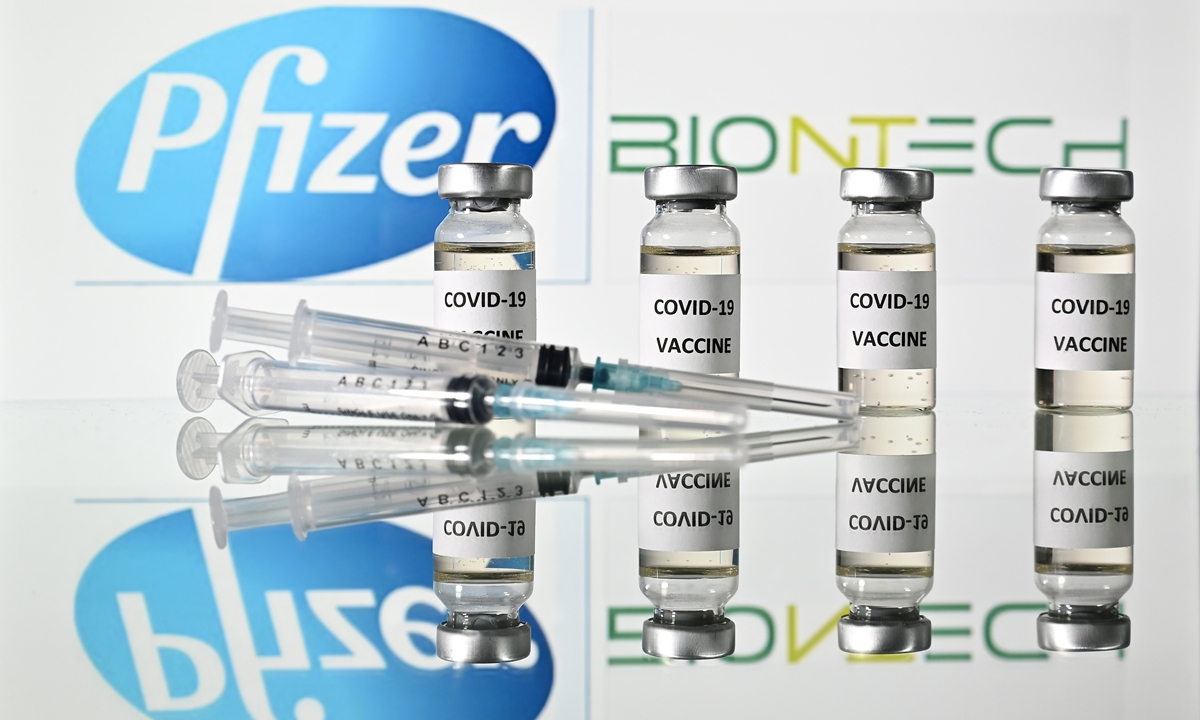China pledges global vaccine cooperation amid unequal distribution fears
By Hu Yuwei and Shan Jie Source: Global Times Published: 2020/11/23 21:58:53

Photo: AFP
China said it will prioritize the strengthening of international cooperation on vaccine development, and make concrete efforts to promote equal distribution, as the Chinese leader has promised to make the vaccines accessible to developing countries on major diplomatic occasions, including the recent G20 summit.
As some rich countries race to claim the global share of future doses of the vaccine, many raise concerns of deep inequality in vaccine distribution.
"We will honor our commitment of giving assistance and support to other developing countries, and work to make vaccines a global public good accessible and affordable to people around the world," Chinese President Xi Jinping said at the G20 meeting on Saturday.
The remarks came with the pledge of G20 leaders on Sunday to provide affordable COVID-19 vaccines and drugs for "all people," reflecting concerns of a deeper gap among countries caused by the pandemic.
To prevent underdeveloped countries from falling behind in the race to reserve COVID-19 vaccine, China has publicly announced it would offer vaccine doses to BRICS countries, Mekong River countries and African countries at diplomatic occasions since June.
Similarly, Xi said China supports APEC in strengthening policy exchanges and capacity building in vaccine research.
State Councilor and Foreign Minister Wang Yi said vaccines should not be monopolized by any country, or be the exclusive property of big powers or rich countries at the BRICS Ministers of Foreign Affairs Video Conference on September 4.
China officially joined COVAX, an essential platform to guarantee a more equal distribution of worldwide vaccine. The World Health Organization (WHO) and Vaccine Alliance (GAVI), two global leading facilitators in promoting COVAX, said in response to the Global Times that they applauded China's efforts to support vaccine accessibility to some underdeveloped countries, hailing China's decision to join the COVAX, which the US has spurned.
At least four of five Chinese vaccine candidates are under phase three clinical trials in the UAE, Brazil, Pakistan, Mexico and Turkey.
Global Times learned from two leading Chinese vaccine producers that they have sent experts to the clinical trial host countries to help local partners and regulators understand the Chinese-developed vaccine.
African diplomats and senior representatives from embassies of other countries also visited a vaccine plant in Beijing last month to get first-hand knowledge of the vaccines, while seeking more offers from China, Sinopharm told the Global Times. The company has received orders from more than 100 countries so far.
It is estimated that this year, China could produce 600 million COVID-19 vaccines and 1 billion next year, and most of the vaccines would be for export, as China does not have that huge need for the vaccines - a million at most - given the few case in China, Tao Lina, a Shanghai-based virus and immunology expert, told the Global Times on Monday.
Chinese vaccine producers, to boost wider accessibility, have also ramped up efforts to handle the logistical complexities of global vaccine distribution such as a shortage of cold chain equipment and soaring freight market prices.
China's three leading coronavirus vaccine providers - Sinopharm, CanSino, and Sinovac - are working out detailed plans for international procurement and transportation with relevant authorities, a senior expert working with SF Express, who is in charge of COVID-19 vaccine global logistics but prefers not to be named, told the Global Times.
Producers also suggested the vaccines' pricing will be balanced between market prices and the tight budget of partnered countries.
The company creates vaccines mainly to stop the virus and secure more people, but it does not mean the price can be lower than basic R&D costs, said Yu Xuefeng, head of CanSino, in an interview with CGTN.
CanSino will supply Mexico with 35 million doses by 2021 to protect 35 million Mexicans, the Global Times learned from the company on Monday.
Tao noted that the price of a single dose could be lower than 50 yuan ($7.60) as more mature technology on the vaccine will decrease its cost in the near future.
Repeated emphasis on vaccine accessibility and affordability shows that China aims to be a reliable player in the global cooperation against the virus, and honor its promises by sharing its lower-priced but qualified vaccines, experts said.
China is likely to provide vaccines to some countries in difficulty with very low prices, even for free if requested, Jiang Shixue, an expert on international relations at Shanghai University, told the Global Times on Monday. It is possible that China will share its technologies with local pharmaceutical factories in other regions, such as Africa, to reduce costs, Jiang noted.